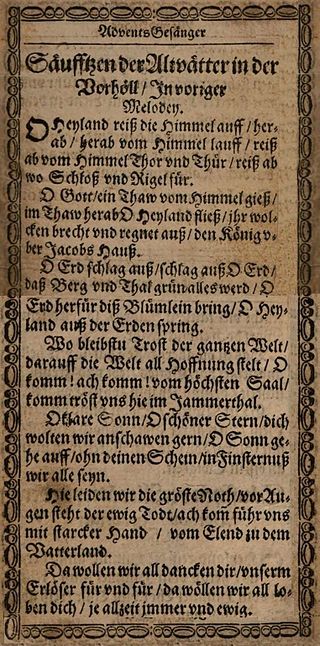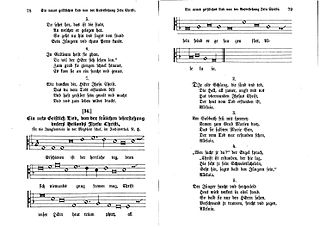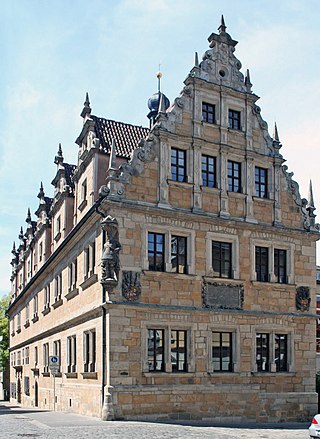Related Research Articles

Nikolaus Herman was a German Lutheran cantor and teacher, creating numerous Protestant hymns. Some of them are contained in hymnals in several languages.

"Gott sei gelobet und gebenedeiet" is a Lutheran hymn of 1524 with words written by Martin Luther who used an older first stanza and melody. It is a song of thanks after communion. Luther's version in three stanzas was printed in the Erfurt Enchiridion of 1524 and in Johann Walter's choral hymnal Eyn geystlich Gesangk Buchleyn the same year. Today, the song appears in German hymnals, including both the Protestant Evangelisches Gesangbuch, and in a different version in the Catholic Gotteslob.

Lothar Zenetti was a German Catholic theologian, priest, and author of books and poetry. In Frankfurt, he was both a minister for young people and a parish priest. He was also active on radio and television. His songs, for example the popular "Das Weizenkorn muss sterben" and "Segne dieses Kind", appear in both Protestant and Catholic hymnals.

"O Heiland, reiß die Himmel auf" is a Christian Advent song. The text was first printed in 1622, attributed to Friedrich Spee; the melody was first printed in 1666.

"Erschienen ist der herrlich Tag" is a German Easter hymn, with text and tune written by Nikolaus Herman and published in 1561. It has inspired musical settings by composers from the 17th to the 20th century. It appears in several hymnals, including the German Protestant hymnal Evangelisches Gesangbuch. Other hymns, especially Easter hymns, in both German and English, are sung to the same melody.
"Den Herren will ich loben" is a Christian hymn by Maria Luise Thurmair, based on the Magnificat and set to a 1613 melody by Melchior Teschner, which was used for "Valet will ich dir geben". The hymn in three stanzas of eight lines was first written in 1954, and revised in 1971. It appeared in the Catholic hymnal Gotteslob in 1975, and in the current Gotteslob, but also in a German Protestant hymnal. A general song of praise, it has been set to music several times.

"Jerusalem, du hochgebaute Stadt" is a German Christian hymn with lyrics written by the Lutheran Johann Matthäus Meyfart in 1626, and a melody possibly by Melchior Franck. Its theme is the New Jerusalem as the ultimate destination of the Soul, as the subtitle says "Ein Lied vom Himmlischen Jerusalem". Originally in eight stanzas, it appears in seven stanzas in the Protestant hymnal Evangelisches Gesangbuch as EG 150), and in five stanzas in the Catholic Gotteslob as GL 553. It was of only regional importance during the Baroque period, but was rediscovered, often printed and set to music from the 19th century.

Otto Riethmüller was a German Lutheran minister, writer, and hymnwriter. He was the president of Protestant youth organisations from 1928, published songbooks, and was a leading member of the Confessing Church. He designed the Protestant youth organization's logo, the Cross on the Globe, which is still used today.
"Sag ja zu mir, wenn alles nein sagt" is Christian hymn, with lyrics written by Diethard Zils in 1971, and music by made a hymn of the genre Neues Geistliches Lied with a melody by Ignace de Sutter. It is a penitential song, which appeared in the Catholic hymnal Gotteslob of 1975. In the 2013 version, it appears only in regional sections.
"Mein ganzes Herz erhebet dich" is the beginning of German hymns to a melody from the 16th century, which paraphrase Psalm 138. They are part of Protestant and Catholic hymnals.

"Im Frieden dein, o Herre mein" is a three-stanza German Christian communion hymn. In 1527 the early Reformer Johann Englisch wrote two stanzas as a rhyming close paraphase of the Nunc dimittis, or Canticle of Simeon. The hymn is sung to a melody by Wolfgang Dachstein, written before 1530. Friedrich Spitta revised the lyrics in 1898 and added a third stanza. His revision transformed Englisch's prayer of an individual with a focus on a peaceful death to a communal one more about peaceful life in unity.

"Wir pflügen und wir streuen" is a sacred song about thanksgiving for harvest, with text by Matthias Claudius. It was first published in 1783 as Das Bauernlied. It became a hymn, with melodies by Johann André and Johann Abraham Peter Schulz. It appears in the current German Protestant hymnal Evangelisches Gesangbuch as EG 508 with the latter melody, and is used mostly for the German Erntedankfest. Jane Montgomery Campbell translated it to English in 1861 as "We plough the fields and scatter".
"Nun lässest du, o Herr" is a Christian hymn by Georg Thurmair written in 1966 as a paraphrase of the Nunc dimittis canticle. It was part of the German Catholic hymnal Gotteslob of 1975 as GL 660 with a 16th-century melody by Loys Bourgeois. With this melody, it is also part of the Protestant hymnal Evangelisches Gesangbuch as EG 695. It is part of the second edition of the Gotteslob as GL 500, with a new 1994 melody.

"Seht, er lebt" is a Christian poem written by the Catholic priest Lothar Zenetti in 1973. With an Israeli melody, it became an Easter hymn in the Neues Geistliches Lied (NGL) genre, first published in 1975. In the 2013 Catholic hymnal Gotteslob, it appears as GL 781 in the regional section for the Diocese of Limburg.

"Liebster Jesu, wir sind hier" is a Lutheran hymn with text written by Tobias Clausnitzer in 1663, and a hymn tune, Zahn No. 3498b, based on a 1664 melody by Johann Rudolph Ahle. A prayer for illumination, it is suitable for the opening of a church service and to be sung before a sermon. The song is part of the Protestant hymnal Evangelisches Gesangbuch as EG 161. It is also part of the Catholic hymnal Gotteslob as GL 149. It is popular also in English translations such as "Blessed Jesus, at your word" by Catherine Winkworth.
"Einer ist unser Leben" is a poem in five stanzas, written by Lothar Zenetti in 1973. It became a Christian hymn of the genre Neues Geistliches Lied (NGL) with a 1971 melody by Jean Liesse. The song is part of many hymnals, both Catholic and Protestant, and of songbooks, remaining popular in the 21st century.
Christoph Lehmann is a German organist, harpsichordist, church musician and composer, especially in the field of Neues Geistliches Lied (NGL). He has worked as a continuo harpsichordist and organist in performances and recordings of early music with several ensembles.
Habakuk is a German pop band from Frankfurt, formed in 1975. The group is focused on new Christian music of the genre Neues Geistliches Lied.
Kurt Rommel was a German Protestant pastor of the Evangelische Landeskirche in Württemberg, author of spiritual books, and hymnodist. He wrote text and tune of hymns contained in both Protestant and Catholic hymnals.
"Kommt herbei, singt dem Herrn" is a Christian hymn with text by Diethard Zils in 1972, a paraphrase of Psalm 95 to an Israeli melody. It is of the genre Neues Geistliches Lied (NGL), published in 1972. In the 2013 Catholic hymnal Gotteslob, it appears as GL 140. It is also contained in other hymnals and songbooks.